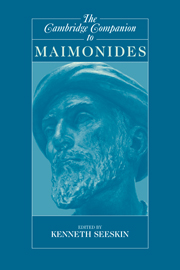Book contents
- Frontmatter
- Introduction
- 1 Moses Maimonides: An Intellectual Portrait
- 2 The Guide and Maimonides’ Philosophical Sources
- 3 Metaphysics and Its Transcendence
- 4 Maimonides’ Epistemology
- 5 Maimonides’ Philosophy of Science
- 6 Maimonides’ Moral Theory
- 7 Maimonides’ Political Philosophy
- 8 Jurisprudence
- 9 Bible Commentary
- 10 Spiritual Life
- 11 Maimonides: Esotericism and Educational Philosophy
- 12 Maimonides--A Guide for Posterity
- Bibliography
- Index
3 - Metaphysics and Its Transcendence
Published online by Cambridge University Press: 28 August 2006
- Frontmatter
- Introduction
- 1 Moses Maimonides: An Intellectual Portrait
- 2 The Guide and Maimonides’ Philosophical Sources
- 3 Metaphysics and Its Transcendence
- 4 Maimonides’ Epistemology
- 5 Maimonides’ Philosophy of Science
- 6 Maimonides’ Moral Theory
- 7 Maimonides’ Political Philosophy
- 8 Jurisprudence
- 9 Bible Commentary
- 10 Spiritual Life
- 11 Maimonides: Esotericism and Educational Philosophy
- 12 Maimonides--A Guide for Posterity
- Bibliography
- Index
Summary
According to Aristotle, first philosophy or, as he sometimes calls it, theology, investigates being as being, which is to say the highest principles and causes of all things. In dealing with Maimonides, it is important to see that, unlike Aristotle, he did not write a systematic treatise on the nature of being. The subject matter of the Guide of the Perplexed is identified as natural science (the Account of the Beginning) and metaphysics or divine science (the Account of Ezekiel's Chariot). In Maimonides' view mastery of these subjects is needed for human perfection, and it is impossible to fulfill the commandments without them. Simply put: One cannot love God in ignorance. But instead of making an original contribution to physics and metaphysics, Maimonides claims (GP 2.2) that his purpose is to explain the meaning of key terms in the Torah.
There are two reasons for this hesitation. From a religious perspective, Jewish law forbids one to discuss the Account of the Beginning or the Account of the Chariot in a public setting. Thus all Maimonides can do is offer hints or clues that point readers in the right direction and encourage them to reach their own conclusions. From a philosophic perspective, once we get beyond the existence and unity of God, Maimonides doubts that anyone can achieve more than a few momentary insights about the metaphysical realm so that much of what people take to be certain is really a form of conjecture. Although conjecture can be well founded or ill, Maimonides does not regard human knowledge as a seamless web of causes and principles but rather as a patchwork of established truths, educated guesses, and admissions of ignorance. We will see that, in some cases, the third component is as important as the first two.
- Type
- Chapter
- Information
- The Cambridge Companion to Maimonides , pp. 82 - 104Publisher: Cambridge University PressPrint publication year: 2005
- 3
- Cited by

